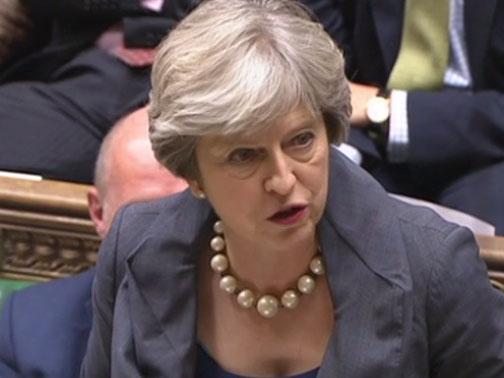Theresa May is happy to answer questions about nuclear war but won't talk about Brexit
That’s the thing about being Prime Minister – there are some questions you answer and some you don’t


Your support helps us to tell the story
From reproductive rights to climate change to Big Tech, The Independent is on the ground when the story is developing. Whether it's investigating the financials of Elon Musk's pro-Trump PAC or producing our latest documentary, 'The A Word', which shines a light on the American women fighting for reproductive rights, we know how important it is to parse out the facts from the messaging.
At such a critical moment in US history, we need reporters on the ground. Your donation allows us to keep sending journalists to speak to both sides of the story.
The Independent is trusted by Americans across the entire political spectrum. And unlike many other quality news outlets, we choose not to lock Americans out of our reporting and analysis with paywalls. We believe quality journalism should be available to everyone, paid for by those who can afford it.
Your support makes all the difference.Funny the questions the Prime Minister will and will not answer. Yesterday she wouldn’t answer how she would vote in a new Brexit referendum. But today, when Jeremy Corbyn asked if she would stop the rollout of Universal Credit, which is causing “debt, poverty and homelessness”, she was prepared to answer.
No, she said, she wouldn’t stop the expansion of the “simpler, better” benefits system that would ensure that “work always pays”.
Corbyn wondered mildly which planet she was on. This wasn’t really a question, but it triggered a complex series of cogs and pulleys in the Prime Minister’s brain, and she answered it 20 minutes later, claiming she was on planet Earth while John McDonnell, the Shadow Chancellor, was on “Planet Venezuela”. At least she didn’t try to repeat Boris Johnson’s antique joke about Caracas.
Back in the present, Corbyn was asking her again to halt Universal Credit, quoting the Citizens Advice Bureau saying it was a “disaster waiting to happen”. May was happy to answer. It was “no” again, backed up with the less-than-reassuring statistic that the number of Universal Credit payments made on time had gone up from 55 per cent to 80 per cent.
Corbyn asked about the six-week wait that is built into the system. May said that people could get advance payments, and more than half of them do.
Finally the Labour leader hit a question Theresa May didn’t want to answer. He said the Universal Credit helpline cost up to 55p a minute, and would she at least make that free? “I’ve said,” she began. “It is working…” This was obviously the first time she had heard about it.
At least she didn’t say it was a hypothetical question, which was her reason for not answering the Brexit question yesterday. When that question, whether she had changed her mind about Brexit, came up today, asked by Ian Blackford, leader of the Scottish National Party in the Commons, she had worked out a better way of not answering it. “There is no second referendum on Brexit,” she said.
There was another question about Brexit she didn’t answer. She wouldn’t guarantee EU nationals in the UK would have the rights they have now when asked by Karen Buck, the Labour MP. “We’re very close to agreement,” she said.
On the other hand, she was happy to answer a question from Wendy Morton, a loyal Tory MP, who asked if she agreed that it was worrying that Labour itself thought a Labour government would cause a run on the pound. As the Prime Minister had already used this threadbare propaganda line in one of her answers to Corbyn, it turned out that, yes, she did agree with herself.
That’s the thing about being Prime Minister. There are some questions you answer and some you don’t. What about a freephone helpline for benefit claimants? “Universal Credit is a better, simpler system,” she said today. How would you vote in a new Brexit referendum? “I don’t answer hypothetical questions,” she said yesterday.
Yet last year she was asked, hypothetically, “Are you prepared to authorise a nuclear strike that could kill hundreds of thousands of men, women and children?”. She replied: “Yes.”
Join our commenting forum
Join thought-provoking conversations, follow other Independent readers and see their replies
Comments